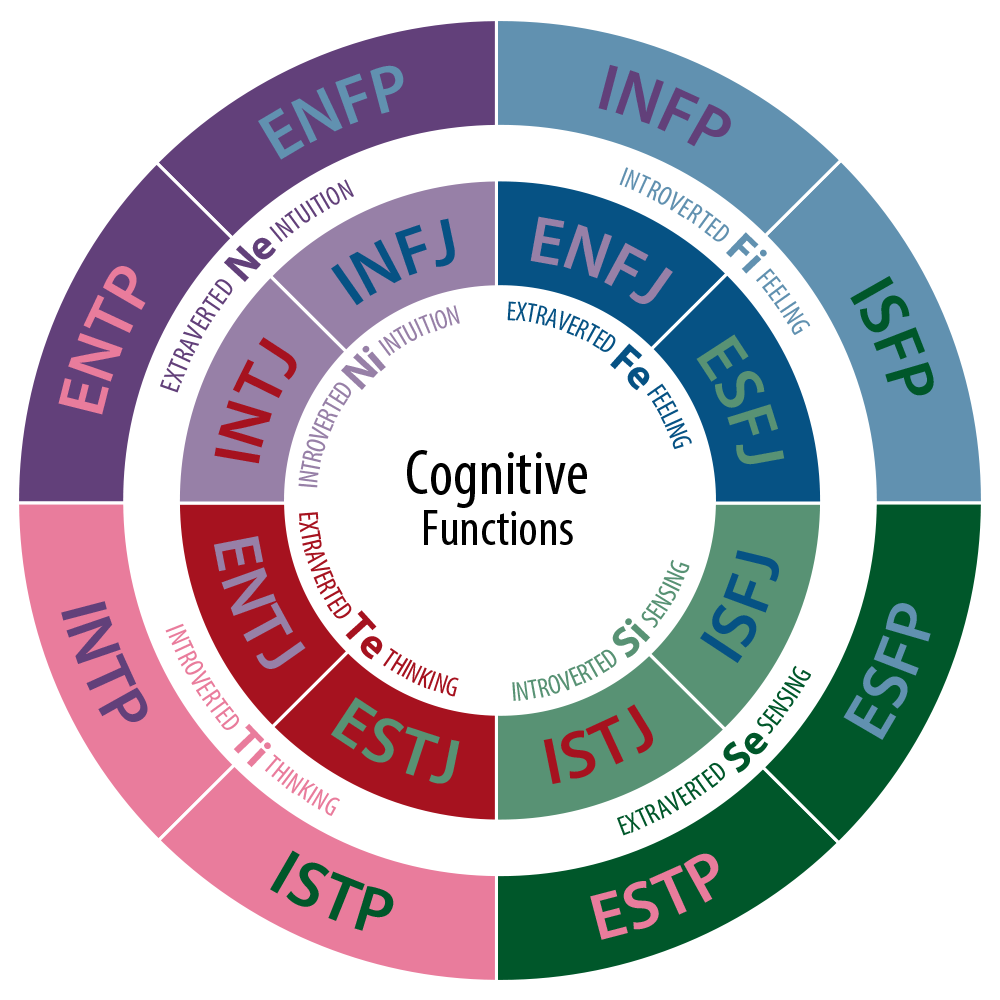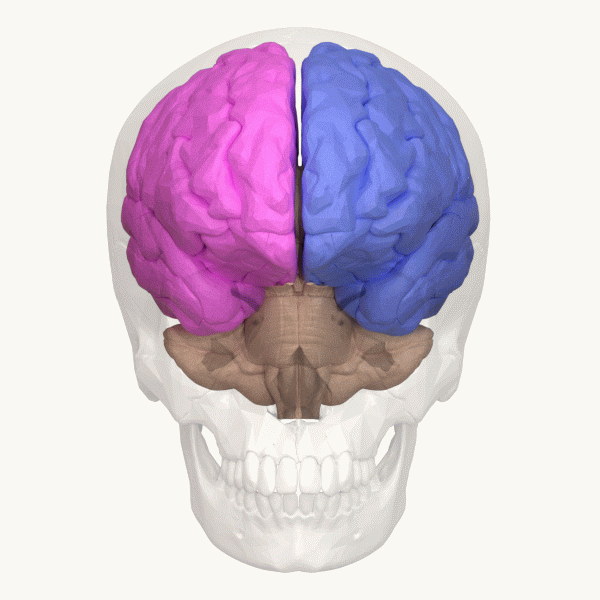|
Jungian Cognitive Functions
Psychological functions, as described by Carl Jung in his book ''Psychological Types'', are particular mental processes within a person's psyche that are present regardless of common circumstances. This is a concept that serves as one of the foundations for his theory on personality type. In his book, he noted four main psychological functions: ''thinking'', ''feeling'', ''sensation,'' and ''intuition''. He introduced them with having either an internally focused (''Extraversion and introversion#Introversion, introverted'') or externally focused (''Extraversion and introversion#Extraversion, extraverted'') tendency which he called "''attitude''". He also categorizes the functions as either ''rational'' (thinking and feeling) or ''irrational'' (intuition and sensation). Psychological functions and attitudes The four psychological functions may be subjugated to the control of consciousness, which can take two attitudes: * Extraversion: "a strong, if not exclusive, determination by ... [...More Info...] [...Related Items...] OR: [Wikipedia] [Google] [Baidu] |
Carl Jung
Carl Gustav Jung ( ; ; 26 July 1875 – 6 June 1961) was a Swiss psychiatrist, psychotherapist, and psychologist who founded the school of analytical psychology. A prolific author of Carl Jung publications, over 20 books, illustrator, and correspondent, Jung was a complex and convoluted academic, best known for his concept of Jungian archetypes, archetypes. Alongside contemporaries Sigmund Freud, Freud and Alfred Adler, Adler, Jung became one of the most influential psychologists of the early 20th century and has fostered not only scholarship, but also popular interest. Jung's work has been influential in the fields of psychiatry, anthropology, archaeology, literature, philosophy, psychology, and religious studies. He worked as a research scientist at the Burghölzli psychiatric hospital in Zurich, under Eugen Bleuler. Jung established himself as an influential mind, developing a friendship with Sigmund Freud, founder of psychoanalysis, conducting a The Freud/Jung Letters, leng ... [...More Info...] [...Related Items...] OR: [Wikipedia] [Google] [Baidu] |
Jungian Archetypes
Jungian archetypes are a concept from psychology that refers to a universal, inherited idea, pattern of thought, or image that is present in the collective unconscious of all human beings. As the psychic counterpart of instinct (i.e., archetypes are innate, symbolic, psychological expressions that manifest in response to patterned biological instincts), archetypes are thought to be the basis of many of the common themes and symbols that appear in stories, myths, and dreams across different cultures and societies. Some examples of archetypes include those of the mother, the child, the trickster, and Flood myth, the flood, among others. The concept of the collective unconscious was first proposed by Carl Jung, a Swiss Psychiatry, psychiatrist and Analytical Psychology, analytical psychologist. According to Jung, archetypes are innate patterns of thought and behavior that strive for Self-realization, realization within an individual's environment. This process of Self-actualization, ... [...More Info...] [...Related Items...] OR: [Wikipedia] [Google] [Baidu] |
Personality Tests
A personality test is a method of assessing human personality construct (psychology), constructs. Most personality assessment instruments (despite being loosely referred to as "personality tests") are in fact introspective (i.e., subjective) self-report questionnaire (Q-data, in terms of LOTS of data, LOTS data) measures or reports from life records (L-data) such as rating scales. Attempts to construct actual performance tests of personality have been very limited even though Raymond Cattell with his colleague Frank Warburton compiled a list of over 2000 separate objective tests that could be used in constructing objective personality tests. One exception, however, was the Objective-Analytic Test Battery, a performance test designed to quantitatively measure 10 factor-analytically discerned personality trait dimensions. A major problem with both L-data and Q-data methods is that because of item transparency, rating scales, and self-report questionnaires are highly susceptible to mo ... [...More Info...] [...Related Items...] OR: [Wikipedia] [Google] [Baidu] |
Vol06PsychologicalTypes
Vol, VOL or Vols may refer to: * Vol (command), a computer operating system command * Vol (heraldry), a heraldic charge * Volatility (finance) * Volume (other) * Volunteer (Irish republican) * Nashville Vols, an American minor league baseball team * Nea Anchialos National Airport (IATA: VOL), an airport located near the town of Nea Anchialos in Greece * Tennessee Volunteers, the sports teams of the University of Tennessee * Republic of Upper Volta, a country in Africa now called Burkina Faso * Vigilantes of Love, an American rock band * Volans, a constellation * Volapük, a constructed international auxiliary language * Volunteer State Community College, a community college in Gallatin, Tennessee * Vol, Iran, a village in Kurdistan Province, Iran * Vol Dooley (1927–2014), former sheriff of Bossier Parish, Louisiana * "Vol", a 2021 song by Merel Baldé Merel Baldé (born 10 February 1991), better known by the stage name Merol (stylized in all caps), is a Dutch singer ... [...More Info...] [...Related Items...] OR: [Wikipedia] [Google] [Baidu] |
Lateralization Of Brain Function
The lateralization of brain function (or hemispheric dominance/ lateralization) is the tendency for some neural functions or cognitive processes to be specialized to one side of the brain or the other. The median longitudinal fissure separates the human brain into two distinct cerebral hemispheres connected by the corpus callosum. Both hemispheres exhibit Brain asymmetry, brain asymmetries in both structure and neuronal network composition associated with specialized function. Lateralization of brain structures has been studied using both healthy and split-brain patients. However, there are numerous counterexamples to each generalization and each human's brain develops differently, leading to unique lateralization in individuals. This is different from specialization, as lateralization refers only to the function of one structure divided between two hemispheres. Specialization is much easier to observe as a trend, since it has a stronger Anthropology, anthropological history. T ... [...More Info...] [...Related Items...] OR: [Wikipedia] [Google] [Baidu] |
Lenore Thomson
Lenore may refer to: __NOTOC__ Arts and entertainment * "Lenore" (poem), by Edgar Allan Poe *Lenore, an unrelated character in the poem "The Raven", also by Edgar Allan Poe * "Lenore" (ballad), a 1773 poem by Gottfried August Bürger * "Lenore" (melodrama), a melodrama by Franz Liszt after Gottfried August Bürger's ballad * Symphony No. 5 (Raff), a symphony by Joachim Raff entitled "Lenore" *the title character of ''Lenore, the Cute Little Dead Girl'', a comic series Places *Lenore, Idaho, an unincorporated community *Lenore, West Virginia, an unincorporated community *Lake Lenore (Washington) *Lenore Lake (Saskatchewan), Canada People * Lenore (given name), a list of people See also *Leonore (other) Leonore may refer to: * Leonore (given name), a list of people with the name * The title character, and original title, of Beethoven's opera '' Fidelio'' * '' Léonore, ou L'amour conjugal'', a 1798 opera by Pierre Gaveaux * Leonore, Illinois, a ... * Lenora (disambiguati ... [...More Info...] [...Related Items...] OR: [Wikipedia] [Google] [Baidu] |
Linda Berens
Linda is an English feminine given name, derived from the Spanish word , meaning "pretty." Linda may also refer to: Names * Linda (given name), a female given name (including a list of people and fictional characters so named) * Linda (singer) (born 1977), stage name of Svetlana Geiman, a Russian singer * Miss Linda, long-time manager and wife of Welsh wrestler Adrian Street Surname * Anita Linda (born Alice Lake, 1924–2020), Filipino film actress * Bogusław Linda (born 1952), Polish actor * La Prieta Linda (1933–2021), Mexican singer and actress * Sarah Linda (born 1987), British actress and model * Solomon Linda (1909–1962), South African Zulu musician, singer and composer who wrote the song "Mbube" which later became "The Lion Sleeps Tonight" Places * Linda, Tasmania, Australia, a ghost town * Linda Valley, Tasmania * Linda, Georgia, a village in Abkhazia * Linda, Bashkortostan, Russia, a village * Linda, California, United States, a census-designated place * ... [...More Info...] [...Related Items...] OR: [Wikipedia] [Google] [Baidu] |
John Beebe
John Beebe (born June 24, 1939) is an American psychiatrist and Jungian analyst in practice in San Francisco. Beebe was born in Washington, D.C. He received degrees from Harvard College and the University of Chicago medical school. He is a past president of the C. G. Jung Institute of San Francisco, where he is currently on the teaching faculty. He is a Distinguished Life Fellow of the American Psychiatric Association. Professional interests and activities A popular lecturer in the Jungian world, Beebe has spoken on topics related to the theory and practical applications of Analytical psychology to professional and lay audiences throughout the United States and around the world. He has been especially active in introducing training in Jungian psychology in China. Beebe is the founding editor of ''The San Francisco Jung Institute Library Journal'', now called ''Jung Journal: Culture & Psyche''. He was the first American co-editor of the London-based ''Journal of Analytical P ... [...More Info...] [...Related Items...] OR: [Wikipedia] [Google] [Baidu] |
Katharine Cook Briggs
Katharine Cook Briggs (January 3, 1875 – July 10, 1968) was an American writer who was the co-creator, with her daughter Isabel Briggs Myers, of an inventory of a widely popular personality type system known as the Myers–Briggs Type Indicator (MBTI). Early life Family life Katharine Cook Briggs was born on January 3, 1875, in Ingham County, Michigan. Her father Albert John Cook was on the faculty of Michigan State University, previously known as Michigan Agricultural College. Her mother, Mary Harris Baldwin, attended Oberlin College. After Katharine graduated from college she married Lyman James Briggs, a physicist and Director of the Bureau of Standards in Washington, D.C. On October 18, 1897, Katharine gave birth to Isabel Briggs Myers, the couple's only child who would survive infancy. Education Briggs was home schooled by her father. She never attended a formal school until she left for college at the age of fourteen. Briggs earned a college degree in agriculture ... [...More Info...] [...Related Items...] OR: [Wikipedia] [Google] [Baidu] |




